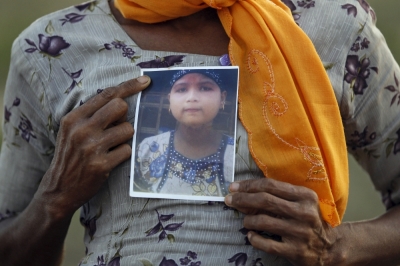The Unseen Culprits Behind Human Trafficking

Earlier this year, a news agency published a photographic report about the tough choice a Somali family had to make.
Displaced from their home by what the U.N. has called "the largest humanitarian crisis since the creation of the United Nations" — four simultaneous famines pushing more than 20 million people to the brink of starvation — the family faced a stark decision: sell their 14-year-old daughter, Zeinab, in marriage or starve to death.
A man had offered to pay Zeinab's family $1,000 for her hand in marriage — a quantity that would literally mean the difference between life and death. Zeinab and her family had subsisted by hiring out their livestock, but the animals died due to the severe drought in Somalia, leaving the family destitute. Selling Zeinab for marriage was their only chance of survival.
Modern-day slavery — especially human trafficking for commercialized sex — usually conjures up images of a shadowy crime syndicate at work in the dark corners of society, abducting innocent women and children and forcing them into prostitution. We don't think about the culprits being famines, natural disasters, migration trends and forced marriages — or even ancestral traditions, temple rituals or homelessness.
We consider modern-day slavery a "good" vs. "bad" problem that can be solved with more police raids and criminal prosecutions. Yet, when we look at the underlying issues, it's rarely that straightforward. There are forms of cultural slavery, so ingrained in a society, they're considered normal and acceptable.
Two examples are Devadasi (which means "female servants of God") and the Banchara (or Banjara) tribe of India, where cultural slavery has been practiced for centuries.
"In the Devadasi practice, girls as young as 4 years old are 'dedicated' to a local deity. Upon reaching puberty they are then introduced to sexual intercourse," according to a study on the Devadasi commissioned by the International Labor Organization. These girls are not permitted to refuse sex with an interested party, the report continues.
After their inauguration into temple prostitution, the Devadasi are essentially rented as sexual slaves by one man after another. In eight out of 10 cases, close relatives are responsible for making these arrangements with customers.
Most of the Devadasi are Dalits — also known as "untouchables" — and their patrons usually belong to a higher social caste. Because they're born into the lowest rung of this social hierarchy system, the Devadasi are barely considered human. India's Dalits and other low-caste groups are often the targets of hostilities, discrimination and violence, which result in impoverishment, illiteracy and further exploitation.
After a life of sexual servitude — which deprives them of an education and often leaves them sick and in poor health — the Devadasi oftentimes turn to the only thing they've known: the sex industry in larger cities.
Though this practice was outlawed in 1988, it's believed there are still hundreds of thousands of Devadasi in India. The south-central states of Telangana and Andhra Pradesh alone are said to house 80,000.
Head north to Uttar Pradesh, and you'll find the Banchara tribe.
For more than 500 years, pre-teen girls have served as the main currency of this low-caste group. According to the Banchara's Nari Mata tradition, girls — at the age of 12 — must enter into a life of prostitution to provide for their families and, more often than not, to pay for their brothers' dowries.
Because women are expected to be the main source of income, every family member plays a role in perpetuating the Nari Mata tradition: mothers groom their daughters into the trade; brothers solicit clientele, and fathers negotiate the prize of their daughters' virginity with the highest bidder.
Girls from the Banchara community often end up trapped in this cycle of cultural slavery. In most cases, they spend their entire lives paying someone else's debts and, in the end, are left with no other choice but to train their daughters to do the same.
According to UNICEF, there are an estimated 21 million victims of human trafficking and sexual exploitation worldwide. If we want to tackle this massive global problem, we have to address it story by story, understanding each victim's current situation and how he or she arrived there in the first place.
The journey that takes a Nigerian migrant from her home to the brothels of Italy often begins with poverty. Drug abuse and family dysfunction are commonly the conditions that put one in five homeless youth in the U.S. and Canada at risk of human trafficking. The desperation that drives Philippine women to risk their lives in dangerous red-light districts has been linked to poverty caused by natural disasters. And the stories of girls like Zeinab, who are forced into a marriage not of their choosing, often represent a hopeless family's last resort.
If we truly want to rid the world of slavery, we must approach this issue in all its complexity. We cannot settle for a black-and-white perspective.



























